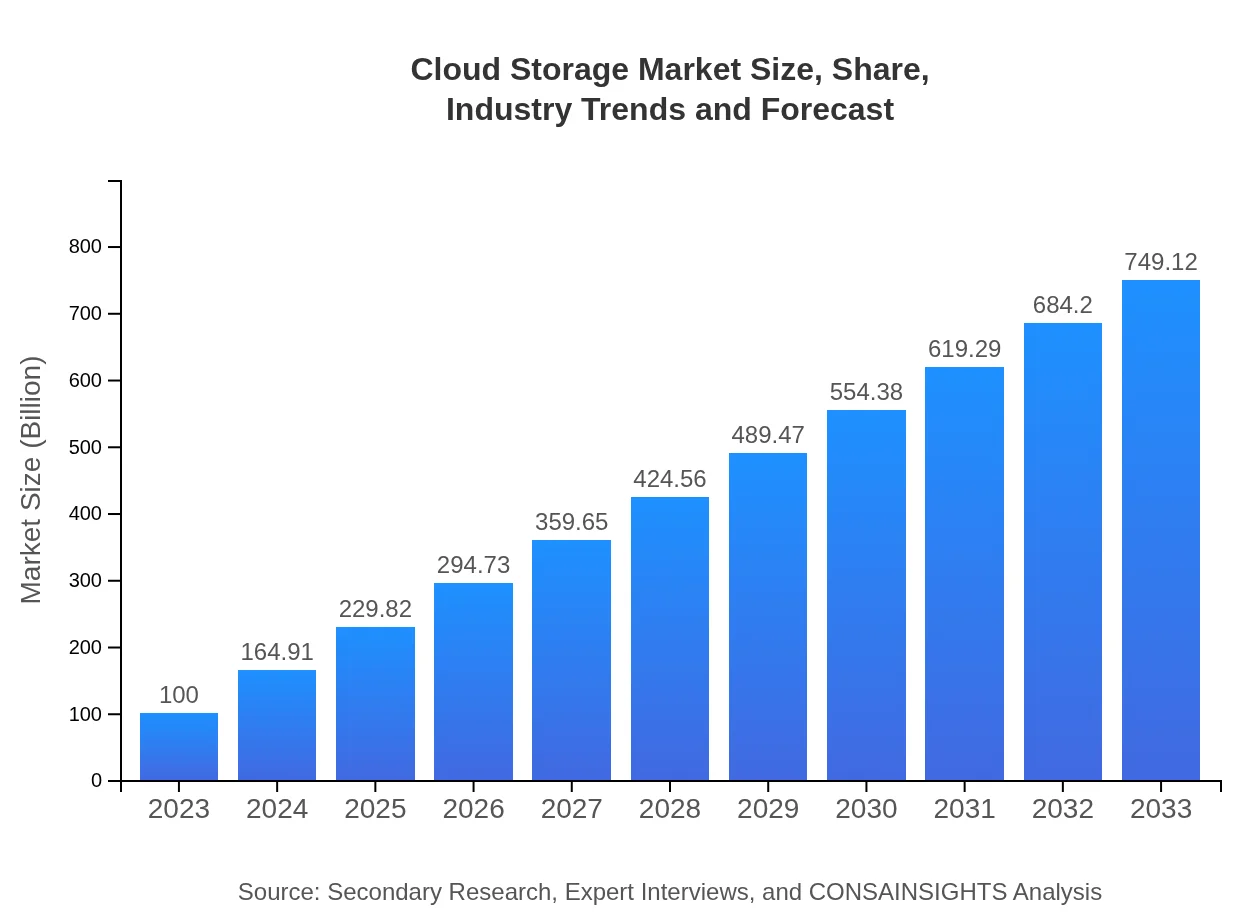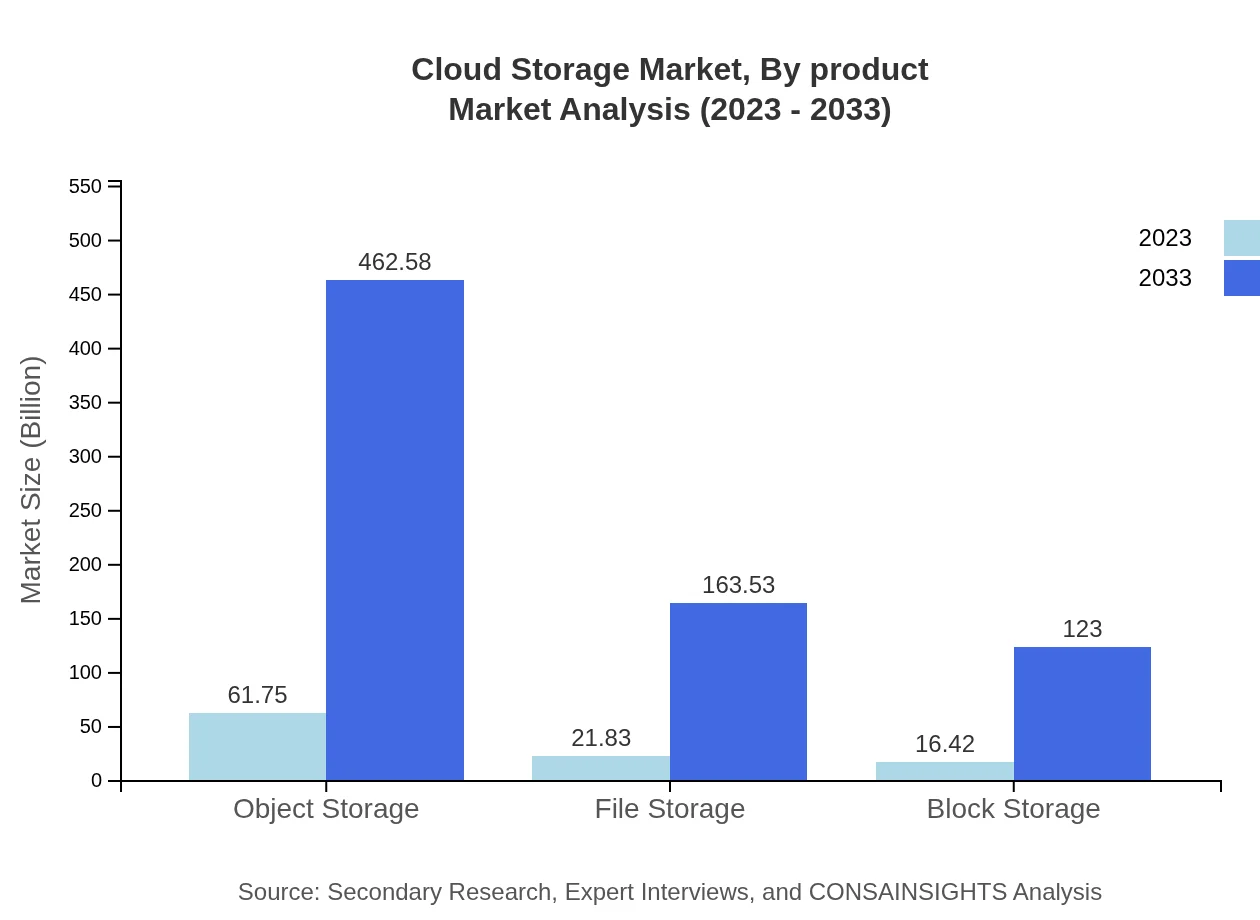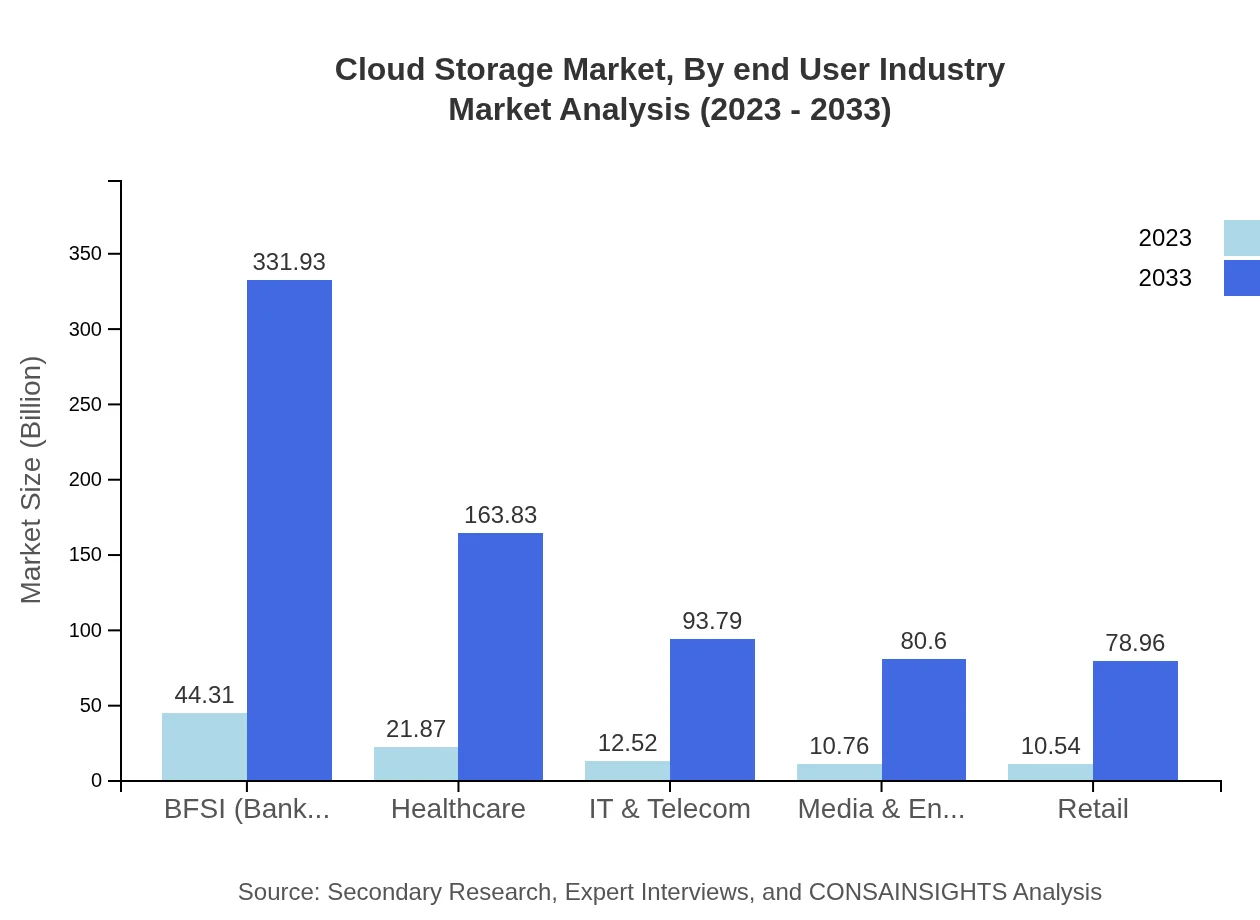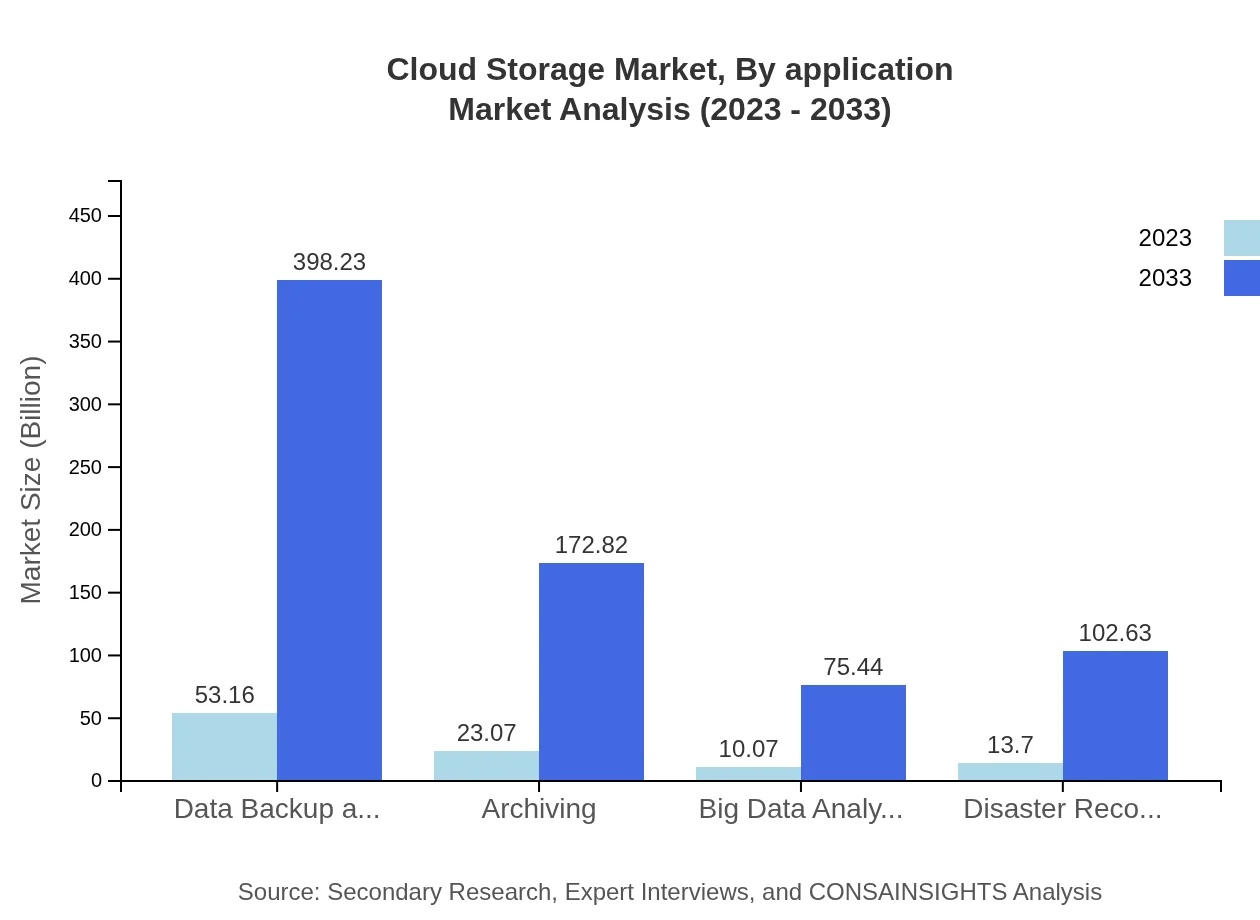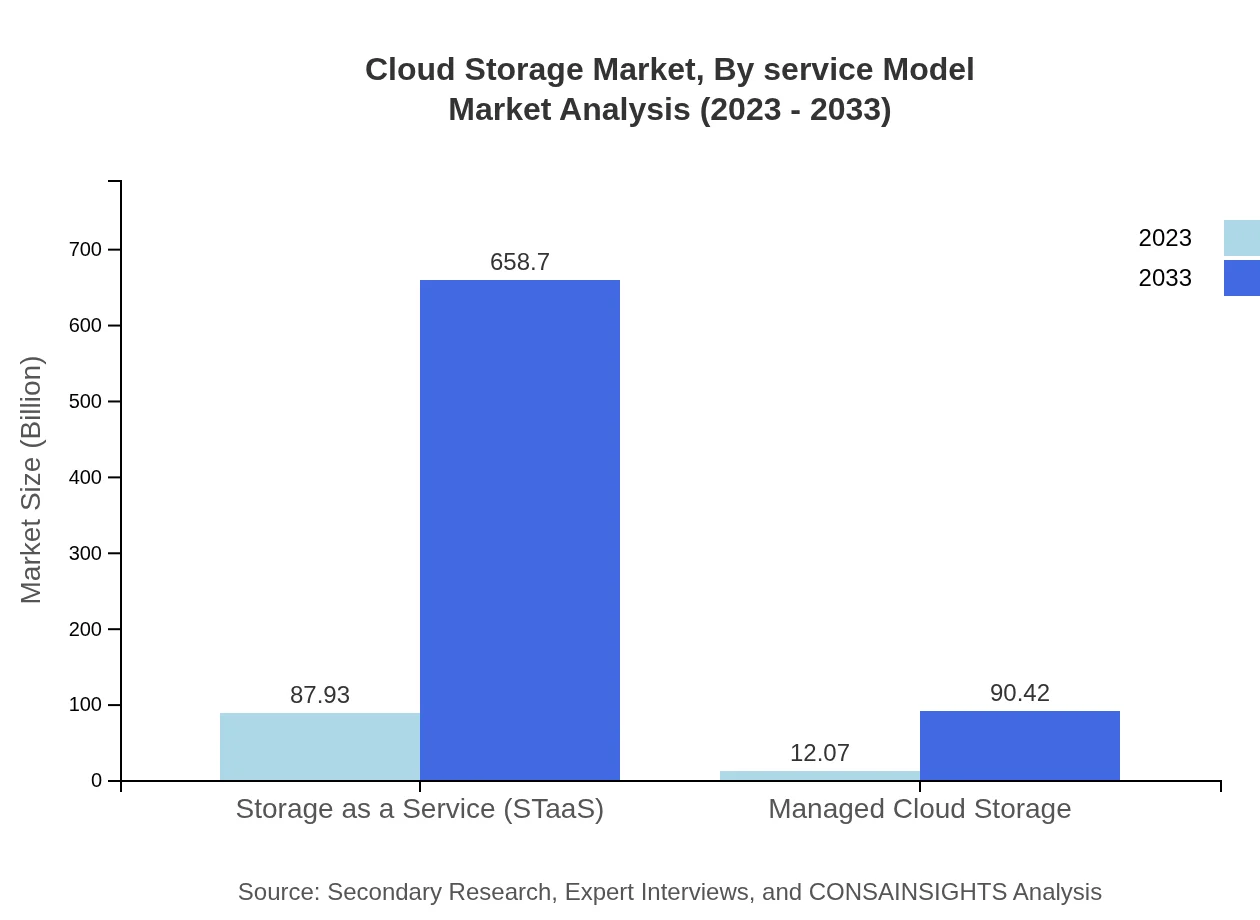Cloud Storage Market Report
Published Date: 31 January 2026 | Report Code: cloud-storage
Cloud Storage Market Size, Share, Industry Trends and Forecast to 2033
This report covers a comprehensive analysis of the Cloud Storage market, providing insights on its size, trends, and forecasts from 2023 to 2033, along with a deep dive into regional dynamics and key players shaping the industry.
| Metric | Value |
|---|---|
| Study Period | 2023 - 2033 |
| 2023 Market Size | $100.00 Billion |
| CAGR (2023-2033) | 21.0% |
| 2033 Market Size | $749.12 Billion |
| Top Companies | Amazon Web Services (AWS), Google Cloud, Microsoft Azure, IBM Cloud, Oracle Cloud |
| Last Modified Date | 31 January 2026 |
Cloud Storage Market Overview
Customize Cloud Storage Market Report market research report
- ✔ Get in-depth analysis of Cloud Storage market size, growth, and forecasts.
- ✔ Understand Cloud Storage's regional dynamics and industry-specific trends.
- ✔ Identify potential applications, end-user demand, and growth segments in Cloud Storage
What is the Market Size & CAGR of Cloud Storage market in 2023?
Cloud Storage Industry Analysis
Cloud Storage Market Segmentation and Scope
Tell us your focus area and get a customized research report.
Cloud Storage Market Analysis Report by Region
Europe Cloud Storage Market Report:
Europe’s Cloud Storage market is expected to witness remarkable growth, increasing from $29.50 billion in 2023 to approximately $220.99 billion by 2033. The EU’s stringent data protection regulations (GDPR) have led companies to seek reliable and compliant cloud storage solutions, driving up demand. Additionally, the push towards sustainability and green IT practices is influencing cloud service implementations throughout the region.Asia Pacific Cloud Storage Market Report:
In the Asia Pacific region, the Cloud Storage market is projected to grow from $21.39 billion in 2023 to approximately $160.24 billion by 2033. The rise of digital transformation initiatives, increasing internet penetration, and a booming e-commerce sector are key drivers of growth. Notably, countries like China and India are leading the charge in cloud adoption, facilitated by government initiatives supporting digital infrastructure enhancements.North America Cloud Storage Market Report:
North America remains the largest market for Cloud Storage, projected to expand from $32.31 billion in 2023 to $242.04 billion in 2033. The presence of key players, coupled with high adoption rates across enterprises, primarily in BFSI and healthcare sectors, solidifies its leadership. The extensive investment in new technologies such as AI and big data analytics further solidifies demand.South America Cloud Storage Market Report:
The South American market is expected to grow from $6.37 billion in 2023 to $47.72 billion by 2033, driven by the increasing digitization of businesses and data-driven decision-making. Local enterprises are increasingly recognizing the importance of scalable storage solutions to meet evolving operational demands, contributing to this growth.Middle East & Africa Cloud Storage Market Report:
The Middle East and Africa (MEA) market for Cloud Storage is projected to grow from $10.43 billion in 2023 to $78.13 billion by 2033. The gradual shift toward smart technologies and the proliferation of internet-connected devices are contributing factors. Increased investments in digital infrastructure and a focus on data security are driving the adoption of cloud solutions across diverse sectors.Tell us your focus area and get a customized research report.
Cloud Storage Market Analysis By Product
The Cloud Storage market is significantly influenced by various product types. Object Storage is the largest segment, with a market size of $61.75 billion in 2023, expected to reach $462.58 billion by 2033. Other notable segments include Data Backup and Recovery, projected to grow from $53.16 billion to $398.23 billion, and Storage as a Service (STaaS), which will likely expand from $87.93 billion to $658.70 billion within the same timeframe.
Cloud Storage Market Analysis By Deployment Model
In terms of deployment models, the Public Cloud segment leads with a size of $61.75 billion in 2023 and is projected to reach $462.58 billion by 2033. The Private Cloud segment, while smaller, demonstrates strong growth potential, anticipated to move from $21.83 billion to $163.53 billion during the same period. Hybrid Cloud is also gaining traction, expanding from $16.42 billion to $123.00 billion by 2033.
Cloud Storage Market Analysis By End User Industry
The BFSI sector is a predominant consumer in the Cloud Storage market, growing from $44.31 billion in 2023 to $331.93 billion in 2033, driven by compliance and security needs. Healthcare follows closely, expanding from $21.87 billion to $163.83 billion. The IT & Telecom sector, along with retail and media, also signifies important segments showcasing considerable growth.
Cloud Storage Market Analysis By Application
In terms of applications, data backup, archiving, and big data analytics remain prominent drivers. Data backup and recovery is set to rise from $53.16 billion to $398.23 billion by 2033, while archiving solutions will grow from $23.07 billion to $172.82 billion. Big data analytics applications are expected to leap from $10.07 billion to $75.44 billion as organizations increasingly leverage data for strategic insights.
Cloud Storage Market Analysis By Service Model
The service model landscape is primarily occupied by STaaS, leading with an expected size of $87.93 billion in 2023, anticipated to reach $658.70 billion by 2033. Managed Cloud Storage is also gaining traction, projected to grow from $12.07 billion to $90.42 billion, driven by increasing demand for specialized storage management services.
Cloud Storage Market Trends and Future Forecast
Tell us your focus area and get a customized research report.
Global Market Leaders and Top Companies in Cloud Storage Industry
Amazon Web Services (AWS):
AWS leads the market with its comprehensive suite of cloud services including S3 for storage, enabling businesses to scale their requirements seamlessly.Google Cloud:
Offering robust data solutions with a focus on AI and machine learning capabilities, Google Cloud supports businesses in leveraging their data effectively.Microsoft Azure:
Azure is notable for its hybrid cloud solutions, allowing businesses to optimize storage and computing resources across public and private environments.IBM Cloud:
IBM Cloud emphasizes secure and reliable cloud storage solutions, catering to industries with high compliance needs.Oracle Cloud:
Oracle Cloud provides specialized cloud storage services targeting enterprise-level applications and databases, enhancing performance and integration.We're grateful to work with incredible clients.









FAQs
What is the market size of cloud Storage?
The global cloud storage market was valued at approximately $100 billion in 2023 and is projected to grow at a CAGR of 21.0%, reaching significant market sizes in various segments by 2033.
What are the key market players or companies in this cloud Storage industry?
Key players in the cloud storage market include industry leaders such as Amazon Web Services, Microsoft Azure, Google Cloud, IBM Cloud, and Dropbox, each contributing to different aspects and segments of cloud storage solutions.
What are the primary factors driving the growth in the cloud Storage industry?
Factors driving growth include the increasing demand for data storage solutions, the explosion of data generation, the need for disaster recovery, and the rising trends of remote work and digital transformation across various industries.
Which region is the fastest Growing in the cloud Storage market?
North America holds the largest market share, but the Asia Pacific region is experiencing rapid growth in cloud storage, projected to increase from $21.39 billion in 2023 to $160.24 billion by 2033.
Does ConsaInsights provide customized market report data for the cloud Storage industry?
Yes, ConsaInsights offers customized market report data tailored to specific requirements in the cloud storage industry, ensuring clients receive insights that align with their strategic goals.
What deliverables can I expect from this cloud Storage market research project?
Deliverables from the cloud storage market research project include comprehensive market analysis reports, segment insights, competitive landscape summaries, and growth forecasts to guide business decisions.
What are the market trends of cloud Storage?
Current trends in cloud storage include the shift towards hybrid and multi-cloud environments, the growth of Storage as a Service (STaaS), and increased investments in data security and compliance solutions.

